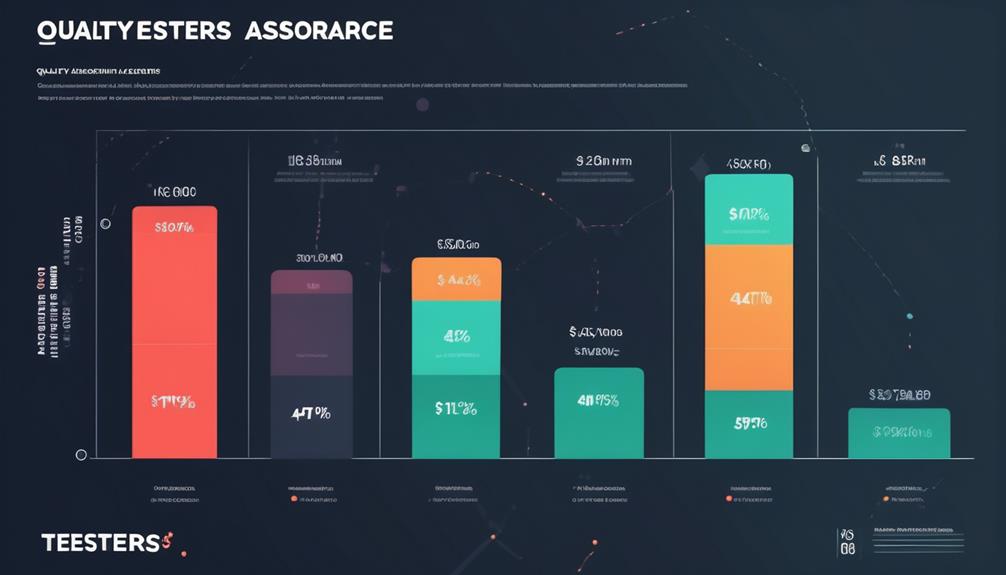When it comes to balancing software testing with job fulfillment, a profession as a quality assurance software tester provides ample opportunities for advancement and progress.
But how does one navigate this niche yet necessary career field?
From educational pursuits to practical experience, the journey to a quality assurance software tester salary is multifaceted and ripe with potential.
So, what are the crucial steps and considerations that pave the way to a rewarding and remunerative career in QA testing?
Key Takeaways
- Education and qualifications, such as a degree in computer science or relevant field, are important for becoming a QA tester.
- Gaining hands-on experience through internships and networking opportunities is essential for career growth in software testing.
- Tailoring resumes and cover letters to highlight relevant skills and experience is crucial for job applications as a QA tester.
- Salaries for QA testers vary based on industry, with the security software industry generally offering higher pay. Additional factors such as education, experience, and location also influence salary.
Education Requirements for QA Testers
When considering the education requirements for QA Testers, it's essential to prioritize obtaining a minimum of an associate degree, while aiming for a bachelor's degree for enhanced qualifications in the field. A degree in computer science, engineering, or mathematics provides a solid foundation for a successful career in software quality assurance and testing. These fields offer courses that cover essential topics such as Testing and Automation, which are integral to a Tester's career path. Pursuing a degree in one of these areas equips individuals with the necessary analytical and problem-solving skills required in the industry.
Additionally, it's crucial to research and choose accredited institutions that offer relevant programs in Software Testing and Quality Assurance. Networking with classmates and instructors during the educational journey is equally important as it can lead to future employment and collaboration opportunities. Furthermore, gaining practical experience through internships while pursuing the degree can significantly enhance the understanding of industry practices and requirements.
Therefore, a focused approach towards obtaining the right educational qualifications is vital for individuals aspiring to excel as QA Testers in the competitive field of software quality assurance.
Gaining Experience Through Internships

Transitioning from the educational requirements for QA Testers, gaining practical experience through internships provides a valuable opportunity to apply industry-specific skills and expand professional connections.
When seeking internships, it's essential to target relevant industries to gain hands-on experience in software testing. Applying for internships with employers in the field of software testing allows individuals to immerse themselves in the Software Development Lifecycle, execute test cases, and gain exposure to the development process.
Additionally, considering both paid and unpaid internship opportunities can be beneficial, as the focus should be on building skills and networking within the industry. Leveraging internships not only offers the chance to expand professional connections but also enhances resumes, demonstrating industry-specific skills to potential employers.
Furthermore, utilizing internships to gain experience in remote work settings can provide valuable insight into the evolving landscape of the industry, preparing individuals to excel as Quality Assurance Analysts or QA Engineers with a deep understanding of testing procedures.
Job Application Tips for QA Testers
To maximize the chances of securing a position as a QA Tester, it's essential to tailor your resume and cover letter to emphasize your relevant skills and experience in software testing and quality assurance.
Highlight your proficiency in conducting manual and automated tests, identifying bugs, and collaborating effectively with developers and stakeholders. Emphasize your attention to detail, problem-solving skills, and knowledge of various QA testing types, such as unit testing and integration testing. Communicate your understanding of quality control and the software development life cycle, as well as your ability to perform acceptance testing (UAT).
Networking with industry professionals and considering internships can provide practical experience and expand your professional network. Research and apply to job openings in industries of interest, considering location, salary, and benefits to find the best fit for your career.
Exploring Average QA Tester Salaries

The average annual wage for QA testers in the US is approximately $72,662, encompassing base salary and additional pay. Salaries for Test Engineers in the quality assurance (QA) field vary based on education, experience, location, and industry.
Here are three important points to consider when exploring average QA tester salaries:
- Specific Industry: Salaries can differ based on the specific industry. For instance, QA testers in the security software industry generally earn more than those in the video game industry due to the complexity and critical nature of security software testing.
- Important Role: QA testers are responsible for ensuring the quality and performance of software products. Their role is vital in preventing issues and ensuring customer satisfaction, which influences their salary expectations.
- Automation Tools and Performance Testing: Proficiency in automation tools and performance testing can significantly impact a QA tester's salary. Skilled professionals in these areas are often in high demand and can command higher compensation.
Understanding these factors can provide valuable insights into the average salaries for QA testers and guide professionals in this field toward career advancement and competitive compensation.
Essential Traits for QA Testers
Exercising keen attention to detail and employing effective communication are vital traits for QA testers to ensure overall productivity, performance, and client satisfaction in software testing.
A deep understanding of how software functions and the ability to work closely with Software Developers is essential. Whether you hold a bachelor's degree in computer science or an associate degree, the ability to identify errors and communicate them clearly is crucial.
QA Testers must possess strong problem-solving skills to identify the source of issues and develop effective solutions. Deductive reasoning and logical thinking are also essential when using factual statements or evidence to form conclusions about the software's performance.
Time management is imperative as QA Testers often work under strict deadlines and need to plan and allocate time effectively.
Furthermore, with the increasing use of mobile devices, QA Testers must be adaptable and have a broad understanding of various platforms and devices to ensure the software's quality across different environments.
Frequently Asked Questions
How Do I Become a Software Quality Assurance Tester?
We become software quality assurance testers by pursuing a degree in computer science or a related field, seeking internships for practical experience, and tailoring our resumes to match industry interests.
Salaries vary based on education, experience, and industry, with security software testers generally earning more.
Skills like attention to detail, effective communication, and problem-solving are crucial for excelling in this role.
How Much Do Software QA Testers Make?
We've found that the national average salary for software QA testers in the United States is $53,688 per year. However, this figure can vary based on education, experience, location, and industry.
It's also worth noting that security software QA testers generally earn more than video game QA testers. Additionally, QA testers may receive additional pay such as commissions, profit sharing, or bonuses, contributing to an average total yearly wage of $72,662.
How Long Does It Take to Become a QA Software Tester?
Becoming a QA software tester typically takes between two to four years, as it involves at least an associate degree, with a bachelor's degree being recommended.
Majoring in computer science, engineering, or math, and networking with classmates and instructors can be beneficial.
Gaining qualifications and experience through internships is essential. Building resumes, trying out skills in a specific industry, and expanding professional networks can all improve future employment opportunities.
What Degree Do You Need to Be a QA Tester?
We need at least an associate degree, with a bachelor's degree being recommended for a career as a QA tester.
It's crucial to research accredited institutions offering relevant qualifications in computer science, engineering, or math.
Networking with classmates and instructors is important for future employment and collaboration opportunities.
Gaining qualifications and experience through internships will help build a strong foundation for a career in QA testing.
Conclusion
In conclusion, becoming a quality assurance software tester requires dedication and hard work, much like tending to a delicate garden.
With the right education, internships, and job search strategies, one can pave the way for a successful career in this field.
It's important to stay informed about average salaries and benefits, as well as to cultivate the essential traits needed for this role.
With determination and attention to detail, the path to becoming a quality assurance software tester is within reach.
Rick, our Software Quality Assurance Writer, is the creative force behind many of our insightful articles and course materials. His unique background in software development, fused with his natural flair for writing, allows him to convey complex QA concepts in a way that is both informative and captivating. Rick is committed to keeping abreast of the latest trends and advancements in software testing, ensuring that our content remains not just relevant, but at the forefront of the field. His significant contributions are instrumental in helping us fulfill our mission to deliver premier QA education.









